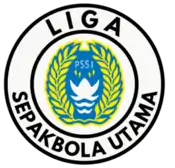Galatama
Liga Sepak Bola Utama (English: Premier Football League), commonly known by its acronym Galatama, was a semi professional football league in Indonesia, established in 1979 by the Indonesian Football Association, PSSI. Prior to the establishment of the competition, an amateur football league named Perserikatan had existed since 1931. Both Perserikatan and Galatama existed and run in parallel until 1994 when they were both merged to form a new, unified league called Liga Indonesia.[1]
 | |
| Founded | 1979 |
|---|---|
| Folded | 1994 |
| Country | |
| Confederation | AFC |
| Level on pyramid | 1 (1979–1982, 1983–1989, 1991-1994) 1–2 (1982–1983, 1990) |
| Domestic cup(s) | Piala Galatama |
| Most championships | NIAC Mitra Pelita Jaya (3 titles each) |
History
Until 1979, the Perserikatan was the only national-level competition in Indonesia. The competition is an amateur competition. Starting in 1979, Football Association of Indonesia started a semi-professional league, named Liga Sepak Bola Utama, shortened to Galatama. Galatama is one of the pioneers of professional and semi-professional football league in Asia alongside the Hong Kong League.
Throughout its history, Galatama always operated in a single-division format except for the 1982–83 and 1990 seasons, when it was divided into two divisions.
Until the 1982–83 season, Galatama allowed the recruitment of foreign players. One of the most famous foreign players in the competition is Fandi Ahmad (Singapore) who played for NIAC Mitra. He successfully led his club to win the Galatama title and he also became an honorary citizen of Surabaya as an award for his performances with NIAC Mitra. Fandi Ahmad and other foreign players were forced to ply their trade outside of Indonesia because of the foreign players ban imposed in Galatama.
After a few seasons, the popularity of Galatama was starting to decline. The cause of the decline is blamed on the banning of foreign players, match-fixing allegations, and also referee bribery scandals. The declining popularity of the league amongst the Indonesian football fans forced many of the league's member clubs to withdraw one by one.
In 1994, Galatama and Perserikatan were merged into the fully professional Liga Indonesia.
List of champions
| Season | Champions | Result | Runners-up |
|---|---|---|---|
| 1979–80 | Warna Agung | Jayakarta | |
| 1980–82 | NIAC Mitra | Jayakarta | |
| 1982–83 | NIAC Mitra | 3–2 | UMS 80 |
| 1983–84 | Yanita Utama | 1–0 | Mercu Buana |
| 1984 | Yanita Utama | 2–0 | UMS 80 |
| 1985 | Krama Yudha Tiga Berlian | 1–0 | Arseto |
| 1986–87 | Krama Yudha Tiga Berlian | 4–2 | Pelita Jaya |
| 1987–88 | NIAC Mitra | 3–1 | Pelita Jaya |
| 1988–89 | Pelita Jaya | 2–1 | NIAC Mitra |
| 1990 | Pelita Jaya | 1–1 (a.e.t.)
(4–2 pen.) |
Krama Yudha Tiga Berlian |
| 1990–92 | Arseto | Pupuk Kaltim | |
| 1992–93 | Arema Malang | Pupuk Kaltim | |
| 1993–94 | Pelita Jaya | 1–0 | Gelora Dewata |
List of top scorers
| Season | Player | Club | Goals |
|---|---|---|---|
| 1979–80 | Hadi Ismanto | Indonesia Muda | 22 |
| 1980–82 | Syamsul Arifin | NIAC Mitra | 30 |
| 1982–83 | Dede Sulaeman | Indonesia Muda | 17 |
| 1983–84 | Bambang Nurdiansyah | Yanita Utama | 16 |
| 1984 | Bambang Nurdiansyah | Yanita Utama | 13 |
| 1985 | Bambang Nurdiansyah | Krama Yudha Tiga Berlian | 9 |
| 1986–87 | Ricky Yacobi | Arseto | 9 |
| 1987–88 | Nasrul Koto | Arseto | 16 |
| 1988–89 | Mecky Tata & Dadang Kurnia | Arema Malang & Bandung Raya | 18 |
| 1990 | Ricky Yacobi | Arseto | |
| 1990–92 | Singgih Pitono | Arema Malang | 21 |
| 1992–93 | Singgih Pitono | Arema Malang | 16 |
| 1993–94 | Ansyari Lubis | Pelita Jaya | 19 |
References
- (in Indonesian) Sejarah Persatuan Sepakbola Seluruh Indonesia (PSSI) Archived 2010-01-03 at the Wayback Machine